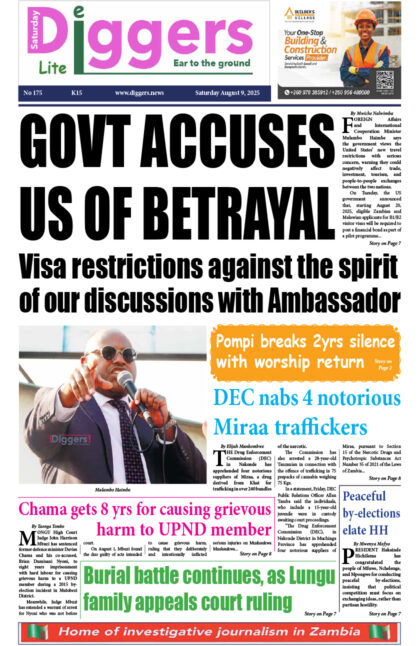There is unrealised potential among craftspeople in Zambia, says British High Commissioner to Zambia Fergus Cochrane-Dyet.
Speaking during a meeting with Tourism and Arts Minister Charles Banda at Ministry’s head office in Lusaka, Friday, High Commissioner Cochrane-Dyet said there is unrealised potential among Zambian craftspeople, hence the need to invest in the sub-sector.
He explained that the British Government, through the Private Enterprise Programme (PEP) is helping the producers raise the quality of crafts, and has so far organised up to five international buyers for the crafts.
“We know that job creation is a top priority for the Zambian government, and we think that there is considerable, unrealised potential amongst craftspeople in Zambia, but they need a market. So, it’s partly about raising the quality of the products, which are produced in Zambia. And our through our PEP programme, we have contacted five international partners who buy these products in volume; they have visited Zambia, and I understand they are interested in taking this forward,” High Commissioner Dyet revealed.
And Banda said talent development in creative arts has been identified as a key area in the job creation agenda for youths in the country.
“We have always been talking about talent development, and when we have done talent development, what comes next is marketing the product. This helps to grow the informal sector. Other than just looking for jobs in the formal sector, sometimes you can get employment through the informal sector; and arts is one such way,” Banda said.
He expressed delight at hearing the possibility of having a viable market for Zambian crafts.
“You [High Commissioner Dyet] have talked about sponsorship coming through. For us, that is very encouraging, we would support that because the moment we have got more buyers who buy in bulk, it means you are encouraging most of our artists to go flat out and do a lot of production, and of course, good production, especially after having received training that can attract international buyers,” said Banda.
He further observed that the arts and crafts industry needed to be developed to continue creating the much-needed employment in the country.
Meanwhile, speaking when US Ambassador to Zambia Daniel Foote paid a courtesy call on him at his office, Banda said the entire Cabinet was aware that nature tourism was about wildlife conservation.
He said poaching had the capacity to reduce wildlife stocks and negatively impact tourism.
“There is a lot of pressure for game meat by chiefs and hence the need to have them grow there own game meat stocks so that they can use it even on traditional ceremonies. This will create controls poaching in the national Parks and Game Management Areas,” said Banda
Earlier Ambassador Foote said Zambia had potential to boost its tourism through Private-Public Partnerships.
The Diplomat said his government was aware that the Department of National Parks and Wildlife (DNPW) was under resourced hence the need for support from other partners.
He pointed out that the US had been supporting DNPW’s wildlife investigation unit the Wildlife Crime Prevention, a Lusaka base non-governmental organisation.
Ambassador Foote said the Millennium Challenge Account had potential to help even in tourism if his government was engaged to look at Zambia in that sphere.
























